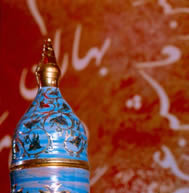




 |
    |
Exhibitions |
||
 |
Three Years of ‘Greece in Britain’ by Paul Watkins
Musical performance has featured strongly, with the emphasis on works, which have sprung from the Hellenic tradition. The revival of interest in Byzantine music has been a particularly strong element in the programme and many will remember the moving performance ‘Ikons of Light’ at the Queen Elizabeth Hall last October. This concert, given by the Greek Byzantine Choir was part of the John Tavener Festival, named for the composer who derives much of his own inspiration from Byzantine liturgical music. The work of popular Greek composers such as Theodorikis and Hadjidikis has also been celebrated in numerous concerts, featuring such well-known vocalists as George Dalaras and Maria Farandouri. The last named gave a particularly striking performance in an evening of music and poetry last May, marking the centenary of the poet George Seferis, whose period as Greek Ambassador in London was recently recorded by the unveiling of a blue plaque in Upper Brook Street. Other contemporary Greek composers whose work has been performed in concerts organised by ‘Greece in Britain’ include Michalis Adamis, Giorgos Koumendakis, Christos Hantzis and Thanos Mikroutsikos. After music, film has been a prominent item, in the repertoire of ‘Greece in Britain’, with retrospectives at the Michael Cacoyannis in May 1999 and Pendelis Voulgaris in June 2000. Challenging examples of contemporary film-making were also seen last year in the ‘New Greek Cinema’ series. In striking contrast, the screening last December of Murnau’s silent classic Faust (1926) at the Purcell Room, South Bank, was accompanied by music specially composed and performed by the Greek guitarist Yorghos Mouloudais with ambient sound projection by Studio 19: a highly compelling combination of music and moving image. Theatre, too, has been represented, with an entertaining and original production of Shakespeare’s Much Ado About Nothing performed by Athens’ Notos Theatre Company in February this year at the Riverside Studios. In the field of art, one of the most successful ‘Greece in Britain’ events was the Byzantine Icon Exhibition at the Hellenic Centre in May 1998. This attracted over 4000 visitors in 14 days, including a midnight visit from HRH The Prince of Wales. |
 |
| © Carolinda Tolstoy 1999-2018 | Web site design: QuincDigital |